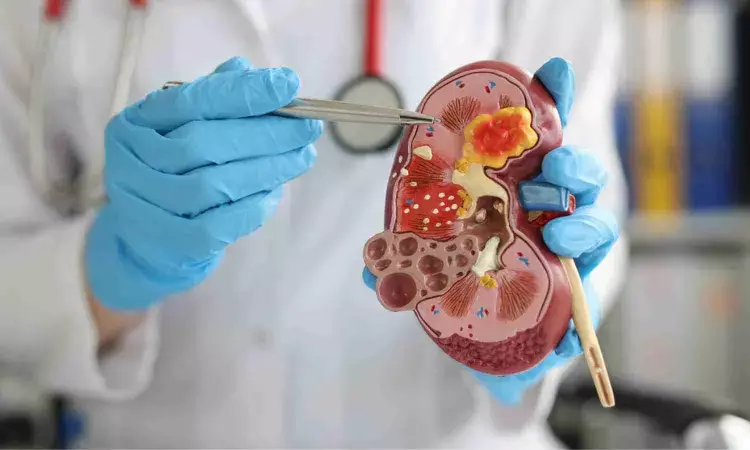- Home
- Medical news & Guidelines
- Anesthesiology
- Cardiology and CTVS
- Critical Care
- Dentistry
- Dermatology
- Diabetes and Endocrinology
- ENT
- Gastroenterology
- Medicine
- Nephrology
- Neurology
- Obstretics-Gynaecology
- Oncology
- Ophthalmology
- Orthopaedics
- Pediatrics-Neonatology
- Psychiatry
- Pulmonology
- Radiology
- Surgery
- Urology
- Laboratory Medicine
- Diet
- Nursing
- Paramedical
- Physiotherapy
- Health news
- Fact Check
- Bone Health Fact Check
- Brain Health Fact Check
- Cancer Related Fact Check
- Child Care Fact Check
- Dental and oral health fact check
- Diabetes and metabolic health fact check
- Diet and Nutrition Fact Check
- Eye and ENT Care Fact Check
- Fitness fact check
- Gut health fact check
- Heart health fact check
- Kidney health fact check
- Medical education fact check
- Men's health fact check
- Respiratory fact check
- Skin and hair care fact check
- Vaccine and Immunization fact check
- Women's health fact check
- AYUSH
- State News
- Andaman and Nicobar Islands
- Andhra Pradesh
- Arunachal Pradesh
- Assam
- Bihar
- Chandigarh
- Chattisgarh
- Dadra and Nagar Haveli
- Daman and Diu
- Delhi
- Goa
- Gujarat
- Haryana
- Himachal Pradesh
- Jammu & Kashmir
- Jharkhand
- Karnataka
- Kerala
- Ladakh
- Lakshadweep
- Madhya Pradesh
- Maharashtra
- Manipur
- Meghalaya
- Mizoram
- Nagaland
- Odisha
- Puducherry
- Punjab
- Rajasthan
- Sikkim
- Tamil Nadu
- Telangana
- Tripura
- Uttar Pradesh
- Uttrakhand
- West Bengal
- Medical Education
- Industry
Post-AKD kidney function may independently predict long-term prognosis of patients with AKI on dialysis: JAMA

Taiwan: A recent cohort study of 6703 participants has revealed the cruciality of evaluating baseline and post-acute kidney disease (AKD) kidney function for understanding the risk of adverse outcomes in patients with acute kidney injury requiring dialysis (AKI-D).
The researchers, in their study published in JAMA Network Open, revealed that baseline kidney function and post-AKD kidney function were significant independent factors linked with major adverse cardiac events (MACEs), all-cause mortality, readmission, and end-stage kidney disease (ESKD) in patients with AKI-D.
"Worse post-AKD kidney function was linked with a progressive rise in the risk of adverse outcomes; however, AKD severity was not associated with adverse outcomes," the researchers wrote.
The researchers mentioned significant associations of interplay among baseline kidney function, severity of acute kidney disease, and post-AKD kidney function with patient outcomes. However, a comprehensive understanding of how these factors are collectively associated with mortality, MACEs, and ESKD in patients with AKI-D is yet to be explored fully. Considering this, Heng-Chih Pan, Chang Gung University College of Medicine, Taoyuan, Taiwan, and colleagues aimed to examine the associations of baseline kidney function, AKD severity, and post-AKD kidney function with MACEs, mortality, and ESKD in patients with AKI-D.
For this purpose, the researchers conducted a nationwide, population-based cohort study of patients with AKI-D between 2015 and 2018, using data from several healthcare settings included in the Taiwan nationwide population-based cohort database.
Exposure to severe AKI and baseline and post-AKD kidney function were determined.
The study's primary outcomes included all-cause mortality and incident MACEs and secondary outcomes were risks of permanent dialysis and readmission.
The study led to the following findings:
- A study enrolled 6703 of 22 232 patients (mean age, 68.0 years; 57.4% male) with AKI-D, with post-AKD kidney function follow-up and AKD stage data.
- During a mean 1.2 years of follow-up, the all-cause mortality rate was 28.3%, while the incidence rates of MACEs and ESKD were 11.1% and 16.7%, respectively.
- After adjusting for known covariates, both post-AKD kidney function and baseline kidney function, but not AKD severity, were independently associated with all-cause mortality, MACEs, ESKD, and readmission.
- Worse post-AKD kidney function correlated with progressive and significant increases in the risk of adverse outcomes.
In conclusion, in the cohort study of patients with acute kidney injury requiring dialysis, more than one-quarter of patients died following 1.2 years of follow-up. Baseline and post-AKD kidney functions are important factors linked with the long-term prognosis in AKI-D patients.
"Therefore, concerted efforts to understand the transition from post-AKD to chronic kidney disease are crucial," the researchers wrote.
Reference:
Pan H, Chen H, Teng N, et al. Recovery Dynamics and Prognosis After Dialysis for Acute Kidney Injury. JAMA Netw Open. 2024;7(3):e240351. doi:10.1001/jamanetworkopen.2024.0351
Dr Kamal Kant Kohli-MBBS, DTCD- a chest specialist with more than 30 years of practice and a flair for writing clinical articles, Dr Kamal Kant Kohli joined Medical Dialogues as a Chief Editor of Medical News. Besides writing articles, as an editor, he proofreads and verifies all the medical content published on Medical Dialogues including those coming from journals, studies,medical conferences,guidelines etc. Email: drkohli@medicaldialogues.in. Contact no. 011-43720751


